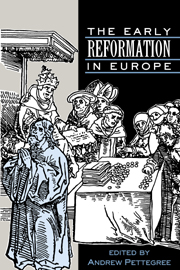9 - Italy
Published online by Cambridge University Press: 06 January 2010
Summary
At the outset of any discussion of the Reformation in Italy, the point needs to be stressed that Italians of all sorts and conditions were at least as susceptible to the intellectual and spiritual message of the European Reformation as the other peoples of the Continent. Until fairly recently Italy tended to be treated as a special case in Reformation history. Some historians, seeing early sixteenth-century Italian clerics espouse reforming church politics and Augustinian theology, seemed uncertain how to classify their views: as late medieval reformism, Renaissance humanism, precocious Counter-Reformation spirituality, or quite what. From this uncertainty was born the concept labelled (unhelpfully) as Italian ‘Evangelism’, which despite attempts to supplant it, retains a strong hold on the literature. Such Evangelism was alleged to have been undogmatic and aristocratic: undogmatic, because those who discussed the cardinal Reformation doctrine of justification by faith did not use it as a weapon to attack the entire fabric of the church; rather they retreated into ‘hazy, vague religiousness’ and practised the traditional rites. It was also claimed that some ‘evangelicals’, even when they appeared to teach doctrines identical to those of the Protestant reformers, did so after reaching their views independently, without deriving them directly from Luther or Calvin. Secondly, the evangelicals were ‘aristocratic’, in that they regarded their special doctrines and meditations simply as topics for discussion in pious literary salons. They did not (so the argument goes) take their arguments into the pulpits and streets to stir up religious revolution as the reformers did. They did not expose their opinions to the mob.
- Type
- Chapter
- Information
- The Early Reformation in Europe , pp. 188 - 214Publisher: Cambridge University PressPrint publication year: 1992
- 3
- Cited by

